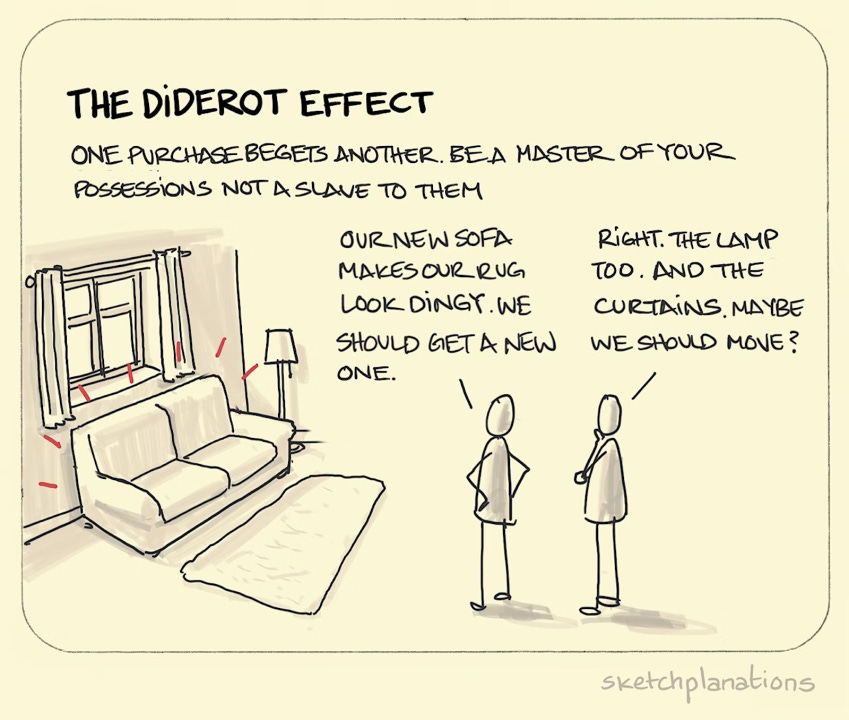When a Red Robe Leads to Trouble…
In 1765, the renowned French philosopher Denis Diderot had a serious problem: His daughter was about to be married.
Normally this would be something for celebration, but Diderot had a shameful, and not well-kept secret. Despite an incredibly successful career as a philosopher, art critic, and writer (best known for being the co-founder and chief editor of France’s first-ever Encyclopedia), Diderot was poor. So poor in fact, that he couldn’t afford to pay for his daughter’s wedding.
But then fortune struck. When Catherine the Great, the Empress of Russia (and long-time fan of Diderot’s work), heard of his financial troubles, she offered to buy his personal library from him for 15,000 livres (approximately $60,000 in 2024 USD).
Suddenly Diderot was flush with cash. Excited to prepare for his daughter’s wedding, the philosopher decided that the first order of business was to buy clothes for the celebration. His first purchase: a scarlet robe.
And that’s when everything started to go wrong.

Initially, the scarlet robe delighted Diderot. It made him feel successful and important. He loved how it looked and wore it often. But then he began to notice how out-of-place his new fancy robe looked in the wardrobe compared to his other poorer (and more drab) possessions. The red robe seemed so conspicuously out of place.
He became dissatisfied that his other possessions didn’t live up to the elegance and style of his new possession. He started by replacing his old straw chair with an armchair covered in Moroccan leather; his old desk was replaced with an expensive new writing table; he bought a new rug from Damascus to replace his old tattered rug; his old cotton shirts were replaced with silk ones, and he decorated his home with beautiful sculptures and a better kitchen table.
Before long, Diderot had spent almost all of the money from the Empress of Russia on new possessions and was as poor as ever. And the realization that he was right back where he had started made him profoundly unhappy.
Reflecting on his experience, Diderot later wrote “I was absolute master of my old dressing gown, but I have become a slave to my new one” (source: “Regrets on Parting with My Old Dressing Gown, 1769)
The Diderot Effect
Based on this story, the scholar George McCracken formally coined the term “the Diderot” effect to describe what happens when buying something new causes a chain reaction of buying more and more things because the new item makes you feel like you now need other things to go with it (or keep up with it).
(If you’re interested here’s a short, but fun, video from the BBC explaining what the Diderot Effect looks like in practice).
The primary reason this happens is psychological. We develop a “cognitive dissonance” that things don’t seem to fit together anymore. It bothers us that some of our things are new, while others are older / worse / poorer / etc.

My wife and I just personally experienced the “Diderot Effect” earlier this month. Our master bathroom was in desperate need of re-tiling (seriously it was pretty gross), and so we decided to pay a friend to fix it up for us. But then I felt like if we were fixing up our bathroom, then we should also tidy up our bedroom. Then I suggested that we should also fix up our kids’ bathroom since it was down the hall “and it would be too weird to have 1 nice modern bathroom while the other still looked like it was stuck in the 80’s”.
Before you knew it, we had a whole team of contractors over fixing up our entire main floor from lighting in the living room to our fence outside. And it certainly cost me a lot more than if I had just been content with sticking to our original bathroom remodel.
The Red Robes in our Careers…
The implications of the Diderot effect are pretty easy to see when it comes to finances. What is less obvious is the effect Diderot’s tale can have on our careers.
Picture this: You’ve just been promoted to a new position in your company, perhaps a coveted managerial role or a position of greater responsibility. Much like Diderot’s Red Robe, this promotion can subconsciously trigger a cascade of changes in how you perceive yourself in the workplace.
Suddenly, you feel a palpable pressure to embody the archetype of a ‘successful professional’—confident, authoritative, and decisive. You might feel compelled to upgrade your wardrobe to reflect your newfound status (ex: invest in nicer clothes, a new watch, or a new car), or even adopt new mannerisms (ex: how you speak in meetings or treat your team members) that align with your idea of what a ‘leader’ should be like.
Without even realizing it, you’ve allowed your promotion to change how you act as a person. Sometimes that’s a great thing (ex: you become more confident, more polished), but it can also be negative (ex: you become more arrogant, spend on things that don’t matter, etc.)
The point of all of this is to ultimately remember Diderot’s warning: Don’t ever let a new possession (or something like a promotion, a new job, etc.) become your master.
Resist the temptation to shed your identity like an outgrown skin to match your external possessions, titles, job, etc…. Rather embrace what is truly authentic and important to you. If you like the old straw chair, keep it. If you feel like your dress style represents who you are, don’t change it. If you enjoy how you speak, don’t change.
Ralph Waldo Emerson once said “Things are in the saddle, and ride mankind”
Be someone who refuses to be ridden.


